Peter MALONE
Saturday, 18 September 2021 20:00
Pawno
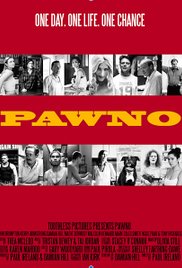
PAWNO
Australia, 2015, 89 minutes, Colour.
John Brumpton, Damian Hill, Maeve Dermody, Malcolm Kennard, Mark Coles Smith, Kerry Armstrong, Tony Rickards, Daniel Frederiksen, Ngoc Phan, John Orcsik.
Directed by Paul Ireland.
There is a lot to like, and a lot of people to like, in this Melbourne slice of life. The action takes place in Barkly Street Footscray, the street, the traffic, the range of shops, centring on the pawnshop, and the whole action of the film taking place from morning till evening.
This is an Australian slice of life, a Melbourne suburban slice of life, a slice of life in the western suburb of Footscray. The audience gets to know quite a number of characters in themselves, their interactions, the range of men and women, young and old, wealthy and poor, homeless people, women working in restaurants and takeaway, in bookshops, multi-cultural community, multiracial, aboriginal, Vietnamese…
The screenplay was written by Damian Hill who appears in the central role of Daniel. It is a perceptive screenplay – although peppered with some extremely blunt language – showing the harshness of people as well as the kindness of people, serious and humorous, some wisecracks, some thoughtful remarks.
The film opens with the pawnshop opening, John Brumpton as Les, the owner, a touch world-weary, imposing on Daniel to do odd jobs in the shop, but kindly to many of the customers, tough with some, even brutally bashing one, a man with a kind heart, but not always kind.
The cast includes Kerry Armstrong as the sad mother, Malcolm Kennard and Mark Coles Smith (so effective in Last Cab to Darwin) as the two homeless men, and Maeve Dermody in the bookshop.
Over the day, many quiet times in the shop, but a range of customers including the father with young boys, appearing in drag, who needs a loan to take his sons to the movies; an older man, Harry, rich and with a family, who seems to spend his time yarning with Les; a man who wants to sell his video camera but leaves the memory card with some sex escapades on it; an Indian taxidriver, with background as a dentist, who wants to get a GPS so that he can be a pizza delivery man; a wealthy woman whose son has disappeared and taken her jewellery and who wants to find him again; the young man earnestly wanting a ring in order to propose to his girlfriend. The characters are well enough written and well enough acted for each to make an impression.
Outside the pawnshop there are two homeless young men, one a bit more simple but imagining himself tough, the other unemployed but who enjoys reading books and has some culture, getting into mischief during the day; there is the proprietor of the takeaway restaurant, a Vietnamese woman who has a sexual relationship with Les; and there is Claire, who works in a bookshop and gets her glasses frame fixed by Daniel who has something of an infatuation for her, writes a poem, she returning a smiley thank you note – and the possibility of their going out together.
In one sense, not a lot happens, but, in fact, quite a lot does happen in the somewhat miniature but effective episodes, the buildup to quite a humane day, not without serious problems, in the suburb of Footscray, but which has a great deal of universal relevance.
1. An Australian slice of life? Melbourne slice of life? Suburban Footscray slice of life?
2. The atmosphere Footscray, the main street, the shops, the traffic, the people, the range of people? The musical score?
3. One day, focusing on the pawnshop, the range of characters, interactions, sad and happy?
4. The picture of Footscray society, multiracial, wealth and poverty, men and women, education and no education, drugs, sexual aspects, how typical? How universal?
5. The range of characters, well drawn, acted, the dialogue, blunt language, harsh, compassionate, serious and humorous?
6. Les, his age, arrival, his shop, looking at the graffiti, weary, going in, Daniel coming late, reading the paper, the range of goods in his shop, moneylending? His imposing on Daniel to do the work, cups of tea, food in the microwave? Harry and his sitting chatting, wanting the gun? The Vietnamese woman, loud, bringing the food, slinging off at Les, the sexual encounter? The thug, the watch, the brawl, Les bashing the man, taking the watch, later giving it to Daniel, washing the blood? The visit of the Indian man, the GPS, dentist, removing Les’ tooth, giving him the GPS? The man with the video camera, later looking at the memory card and the sexual activity? The mother, wanting information about her son, leaving the photo? The man buying the ring? Daniel and the cheaper price, yet making $700? His jokes about Daniel and his reading the book about the steps of love, letting Daniel go early, taking the Vietnamese woman to the art exhibition and giving the ticket to Claire?
7. Daniel, arriving by train, slightly unkempt, late, his relationship with Les, Les’s criticisms, his making the tea and other odd jobs, arranging the jewellery? His passing the bookshop and waving to Claire? Going out to get the money change, seeing the book ini the window and buying it, reading it? His friendship with Paul and Carlo? His work in the shop, meeting the various customers, listening? The thug and Les beating him? Later getting the gift of the watch? Claire, the poem, the thank you note, his happiness, going to rent the suit? His kindness towards the man wanting the ring, taking the lesser money? His kind heart? The concern about his emotional experiences, mental state? Leaving, the train, going to the art show, his art, Claire present, the nature of the paintings, looking over the city, the happy ending kiss?
8. Claire, working at the bookshop, chatting with her companion, listening to her bawdy talk, her friend as a character, all talk, setting her eye on the young man and his having a gay companion, letting Claire go out, Claire and breaking her glasses, going to the shop, Les and his refusal, change of heart, Daniel helping, her return, Daniel giving her the poem, her response, the smiley card, not wanting to go out, Les giving her the invitation, dressing up, meeting Daniel, the exhibition and her response? The kiss? And the irony of her companion at home by herself?
9. Paul and Carlo, on the street, an odd couple, the aboriginal background, Paul aged 30, thinking he was tough, slow witted, the chat on the street, Carlo reading the books, the friendship with Claire and accompanying her? Very little prospects? Not much money? Carlo going to the takeaway, the reaction of the proprietor, owing the money, sharing the soup, taunting Paul and his dropping the soup, Carlo giving him the rest? Stealing the thug’s car and going for a joyride? At home, on the couch, the drugs, Paul taking them, dead?
10. The young girl singing on the street, as a kind of chorus? The African buskers and their dancing? Daniel watching, the heart beat?
11. The lady from Vietnam, loud, bringing the food, sex with Les, being his girlfriend, treatment of Carlo at the restaurant, going with Les to the exhibition?
12. Paige, in drag, walking the streets, the taunting of the young men, borrowing the money, Les kind to her, the kids on the weekend and taking them to the movies, sitting having the coffee, chatting with Daniel? At home, with the boys, taking off her wig?
13. The young man, taunting Paige, coming to buy the ring, his eagerness, the cost too much, setting his heart on the ring, for proposing to his girlfriend, Daniel compassionate, taking the less amount of money?
14. The mother, at home, well-to-do, the tea in the swimming pool, her car ride, the thug tooting her, her going to see Les, asking about the jewellery, the photo of her son, any news if he should turn up?
15. The Indian, on the phone, background as a dentist, driving the taxi, wanting the GPS for delivering pizza? Les being kind, drawing the tooth, friendship? And the first delivery of the pizza with the completely tattooed man and his courteous thanks and the tip?
16. The man wanting to sell the videocamera, pushy, boasting that he had a new one, Les and Daniel watching the sex and the memory card? His return, no memory card – and the return of it and Les sling off at him? Later seeing him at home with his wife and family?
17. The thug, standover tactics, the watch, Les confronting him, the bashing, dragging him out the back door, his sitting in the park, bloodied? His car getting a ticket? Paul and Carlo stealing his car? Arriving home, his daughter, and the criminals coming to take him
away?
18. The range of characters? Seeing them at the end of the day? Harry and his shooting himself? Some sad endings? And happy endings?
Published in Movie Reviews
Published in
Movie Reviews
Tagged under
Saturday, 18 September 2021 20:00
Insidious: Chapter 3
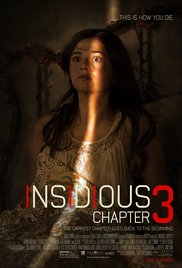
INSIDIOUS CHAPTER 3
US, 2015, 97 minutes, colour.
Dermot Mulroney, Stefanie Scott, Lin Shaye, Leigh Whannell, Angus Sampson.
Directed by Leigh Whannell.
Insidious Chapter 3 is rather a misnomer. It is a prequel to Insidious and Insidious 2.
The focus of this film is a teenager, Quinn, played by Stefanie Scott, who is grieving the death of her mother and who goes to visit the house which will become famous in the previous Insidious films, to consult Elise, hoping that she will be able to make contact with her dead mother. Elise refuses but has a sense that Queen is in need of help.
At home, things are chaotic, her father, Dermot Mulroney, is anxious to keep his job, look after his children, grief for his wife. In the meantime, Quinn is rehearsing for an audition and goes to it, having a sense of her mother there, but also of a presence in the street and being hit by a car.
The film builds up a sense of apprehension, the introduction of a sinister presence, Quinn confined to bed and wheelchair, her father going to see Elise who comes to the home for a session to communicate with the mother but also to confront the sinister presence who is trying to possess Quinn. Also in the act are the two Spectre Sighters from the previous films, Australians Leigh Whannell and Angus Sampson. Leigh Whannell was responsible, with his writing and directing partner, James Wan, for Saw, has written and directed this film – James Wan directing the previous two films.
It is good to see Lin Shaye in a substantial role, which she played in the previous two films.
1. The popularity of the Insidious series? Horror, communication with the world, the role of the dead, demonic pursuits?
2. This film is a prequel, presupposing audience knowledge of what was to happen in the house, the similar experiences?
3. Home, apartments and corridors, New York City, auditions, an atmosphere of reality? The musical score?
4. Atmosphere, the slow burn at the beginning? Apprehensions, contact, the mysterious figure, the mother’s presence, the man trying to breathe, the noises, the crack in the ceiling, the black footprints? Quinn and her dreams, and the floor upstairs, the sinister presence? The other world, possession, the mother, the creature, destruction?
5. Quinn, her age, the death of her mother and her grief, the decision to visit Elise, at the door, at least taking pity on her, listening to the story, her attempt to communicate with her mother? At home, and her father being flustered, the young boy, the pressure on her? Breakfast, food and the fridge, preparation for school? The father and his missing his wife? Going to school, Hector and his friendship, his father? Harry and his wife?
6. Quinn and her friend, chatting, going to the audition, nerves? Seeing the presence? In the street, seeing the presence, hit by the car? Going to the hospital, concern? At home, her broken legs, in bed, the bell, the visit of her friend, texting Hector?
7. The father and his response, the ceiling, with the janitor, the footprints, finding Quinn in the room, saving her from falling, his decision to visit Elise after listening to his daughter?
8. Elise, coming, the decision to have the session, the visuals, at the table, apprehensiveness, Quinn, Elise talking with the mother?
9. Elise and the dream, the confrontation with the Demon, asking the mother to help, Quinn and her not having any eyes, held, the monstrous presence? The mother helping, Elise and the rescue? Quinn returning?
10. The two workers, and their truck, helping Elise, her friendship with them, participating in the seance, apprehensions – their future Insidious work?
11. Elise’s warning, and not to have any contact with her mother afterwards? Happy?
12. Elise, the house, deciding to sell it? The future Insidious experiences?
Published in Movie Reviews
Published in
Movie Reviews
Tagged under
Saturday, 18 September 2021 20:00
Last Knights
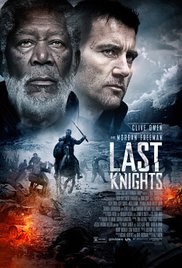
LAST KNIGHTS
UK/ Korea, 2015, 115 minutes, Colour.
Clive Owen, Morgan Freeman, Cliff Curtis, Axel Hennie, Tsuyoshi Ihara.
Directed by Kaz I Kiriya.
Last Knights is something of a hybrid film. The director is from Korea, the finance from the UK, and the cast quite international. It was filmed in the Czech Republic?
With the popularity of Game of Thrones for several years, it was inevitable that stories in this vein would be filmed and produced to capitalise on the trend and popularity.
The film and its impact depend on the characters and performances rather than on the plot which is conventional enough. Morgan Freeman plays the dignified noble, Bartok, who is denounced by an effete and sinister minister, Geser Mott, played by Axel Hennie, who confronts Bartok and has him executed. The execution is to be performed by Bartok’s loyal military head and his designated heir, Raidan and, played by a very serious Clive Owen. Cliff Curtis appears as a loyal supporter.
The main part of the plot is Raidan and and his friends going undercover, pretending to have disbanded, Raidan in going back to drinking, their planning to stay this way until His Mott lowers his guard. Then there is an uprising and the final confrontation – more or less as expected.
1. The popularity of mediaeval stories? The atmosphere of Game of Threatens?
2. Coproduction, UK, Career, International cast? Check locations?
3. The recreation of the period, costumes and decor, castles, interiors, pomp and pageantry? Battles and fights? Audience interest in the mediaeval period and these kinds of games thrones? The musical score?
4. Morgan Freeman as Bartok, Lord, hero, his trust in Raidan, his benign rule? Geser Mott and his jealousy, the role of the Emperor, Geser Mott beating and humiliating him? Bartok’s reaction, accused of treason, the trial, the denunciation of Geser Mott? Raidan and the command that he should execute Bartok? His estate – and Bartok wanting Raidan and to be his heier?
5. Raidan, the troops, loyalty, the fights, the dilemma about the execution? Raidan and his reform from drinking, drinking again, the clashes with his wife, selling Bartok’s sword for drink, Bartok’s daughter in the brothel and his rejection? The links with his friends?
6. Geser Mott, his relationship with the Emperor, kowtowing to him? His own personal behaviour, as Minister, his lies, his defeat of Bartok, his fear of Raidan? Augustine, Ito, his servants, spies, his military, building up his own estate? His being on guard against Raidan?
7. The truth, Raidan and his men, covering, finally emerging when Geser Mott has lowered his guard? The aim of revenge?
8. The plans, intelligence, the links with Ito and Augustine? The Emperor and his attitudes and his decisions?
9. The confrontation, with Geser Mott? The deaths as the loyal soldiers invaded the estate? The character of Cortez, with Raidan and his hopes and arrangements?
10. The buildup to Geser Mott’s confrontation with Raidan? Raidan and the execution of Geser Mott? This being considered a crime? The penalty of death – but, the loyal soldiers, his wife, Raidan and his looking directly at the audience from the screen?
Published in Movie Reviews
Published in
Movie Reviews
Tagged under
Saturday, 18 September 2021 20:00
Risen/ SIGNIS STATEMENT

RISEN
US, 2016, 107 minutes, Colour.
Joseph Fiennes, Tom Felton, Peter Firth, Cliff Curtis.
Directed by Kevin Reynolds.
There is an unusual film phenomenon at the opening of 2016. Two films, Scripture-based, but imaginative interpretations of gospel events.
Since 2000, have been many religious films, success attributed to Mel Gibson’s The Passion of the Christ. there have been quite a number of Jesus films: The Miracle Maker, Mary mother of Jesus, Jesus, The Gospel of John, the South African Son Of Man. It seems that there is an appetite in a wide range of audiences for Biblical films (more recently Noah and Exodus: Gods and Kings).The two films further 2016 are The Young Messiah, a film about Jesus at the age of seven, and Risen, a perspective on the death and resurrection of Jesus from the point of view of a Roman Tribune. This is the kind of story that was developed in the 1953 film, The Robe, and used in the current comedy about Hollywood film-making, Hail, Caesar!.
In an age where the title might suggest zombies in the living dead, is interesting to see that the title is for the risen Jesus. This is a worthy film, in some ways a Roman spectacle but, ultimately, a film about faith.
Technically, the film is very well made, using Morocco settings, re-creation of Jerusalem, Pilate’s residence, Calvary, the disciples in the upper room, as well as the Judaean desert, the sea of Galilee and the mountains. The director is Kevin Reynolds who, in the past, directed such blockbusters as Robin Hood, Prince of Thieves and Waterworld. The film is technically well-crafted.
But, for many viewers, the key question is: how is the resurrection of Jesus treated? Basically, the answer is with reverence and some awe.
The audience is giving the setting of troubles in Judaea at the time of Jesus. There is an opening battle sequence, quite vivid in its action, where the Roman soldiers are confronting the Zealots, the Romans being bombarded by heavy rocks but capitalising on military strategies, using their shields for protection and advancing on the Zealots, defeating them and taking Barabbas. The commander is Claviuis, played very seriously by Joseph Fiennes.
Then we are given the background of Pilate, his concern about beating the Zealots, his remarking to Clavius that he has had trouble, allowing the chief priests to take a prisoner, Yeshua, and crucifying him. Pilate has been troubled and thinks that Yeshua has had a death wish, wanting to sacrifice himself. Pilate and then sends Clavius to Calvary to oversee the breaking of the legs of the thieves and of Yeshua but he authorises the piercing of the issue aside with a lance, despite the Centurion’s professing faith in Yeshua. Mary and the others are glimpsed at the foot of the cross.
This means that the Gospel events are being looked at from the point of view of the Romans. This is particularly the case when Joseph of Arimathea brings a message from Pilate with permission to take the body of Jesus, Clavius inspecting the tomb before the huge stone is rolled over it and Roman seals put on the stone. (The other bodies are seen being thrown into lime pits.)
The film makes much of the incompetent soldiers, drinking on guard, wanting a night off, experiencing something strange and then reporting back to Caiaphas with the invention of the story of the stealing of Jesus’ body. Pilate is insistent to Clavius (and Caiaphas even more insistent) that the body be found and any rumours of Yeshua Risen are quashed.
Which means that the audience goes behind the familiar scenes, with Clavius and his assistant searching for all the recently buried bodies (a desecration that the people abhor) and then interviewing various disciples of Yeshua, including a cheery Bartholomew, an old blind lady, and a very serious Mary Magdalene, identified professionally by a number of the soldiers.
But, one of those interviewed is prepared, Judas-like, to betray the disciples and leads the Romans to the upper room, Clavius entering at the time of Thomas’s encounter with Yeshua and astonished at seeing him.
From this point on, the film changes gear, Clavius rather overwhelmed by what seemed impossible, his leaving his post, travelling north and encountering Peter and the other apostles, sharing their experience with them at the Lake of Galilee, even talking to Yeshua about his search for meaning, and then an ascension scene, not a levitation, but Yeshua speaking the familiar words and walking into the sunrise.
By this stage, the focus is on faith, the encounter with Yeshua and the consequences.
As has been said, the film is well crafted technically, is written with serious intent, performed seriously, with Peter Firth as Pilate and a very sympathetic Cliff Curtis (the New Zealand Maori actor) as Yeshua.
The film will be sympathetically received by believing audiences, by Christians of all denominations, and with some interest in interpreting the Gospels from the Roman perspective by those who do not share faith.
Published in Movie Reviews
Published in
Movie Reviews
Tagged under
Saturday, 18 September 2021 20:00
Young Messiah, The/ SIGNIS STATEMENT
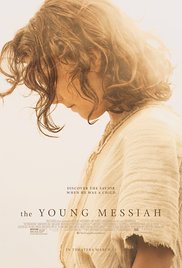
THE YOUNG MESSIAH
UK, 2016, 110 minutes, Colour.
Adam Greaves- Neal, Sean Bean, David Bradley, Jonathan Bailey, Rory Keenan, David Burke, Christian Mc Kay, Isabelle Adriani, Jane Laportaire, Vincent Walsh, Sara Lazzaro, Finn Ireland.
There is an unusual film phenomenon at the opening of 2016. Two films, Scripture-based, but imaginative interpretations of Gospel events.
Since 2000, have been many religious films, success attributed to Mel Gibson’s The Passion of the Christ. There have been quite a number of Jesus films: The Miracle Maker, Mary mother of Jesus, Jesus, The Gospel of John, the South African Son Of Man. It seems that there is an appetite in a wide range of audiences for Biblical films (more recently Noah and Exodus: Gods and Kings).The two films for 2016 are The Young Messiah, a film about Jesus at the age of seven, and Risen, a perspective on the death and resurrection of Jesus from the point of view of a Roman Tribune.
In the credits of The Young Messiah, the film is said to be based on a book by popular novelist Anne Rice. The director of the film, Cyrus Nowrasteh, an American with an Iranian background, co-wrote of the screenplay with his wife, Betsy Giffen Nowrasteh.
The important information, reassuring for faith audiences, is that the film is “inspired by, rooted in” the Scriptures. The film declares that it is an imaginative telling of the story.
The action takes place during Jesus’ seventh year. It opens in Egypt where Mary and Joseph have stayed until they have news, especially in Joseph’s dream, that Herod who had persecuted Jesus and killed the Innocents, has died. The family are living in Alexandria with other refugees from Judaea, especially the family of Clopas, his wife and his son, Jesus’ cousin, James.
Audiences will find this visualising of life in Egypt a helpful filling in background. Jesus is played by a young British boy, Adam Greaves- Neal, giving a fairly serious performance, perhaps wise beyond his years but not understanding quite who he is, his parents not having given him much background of his origins, a boy who is asking questions but who also has moments of play. One of the local boys is a bully and Jesus help save a girl from the bullying when the boy himself trips and dies – Jesus being blamed, but going to visit the boy, touching him and the boy reviving. Joseph is concerned as his Mary and they feel that it is time to return to Nazareth.
Sean Bean plays a Roman Centurion, reporting to the new king, the young Herod Antipas, who remembers the heritage of his father, is superstitious and consults witches, but has heard rumours of the healings of the young Jesus and wants to see him. The role of the Centurion and his men is to hunt down rebels and, as the family make their way towards Nazareth, they encounter the Romans and the Centurion allows Jesus and family to go on their way.
The family eventually arrive in Nazareth, after another healing episode (of Clopas) at the Jordan, then are welcomed by Sarah, and Jesus makes a great impression with his knowledge of Scripture on the local rabbi who knew Jesus’ parents before he was born. But Jesus, still consumed with a desire to know more about who he is, fostered by James telling him the story of the Magi, asks permission of Joseph to go to Jerusalem. In this sequence, the film anticipates Jesus at age 12 and recounts the story of Jesus, meeting the rabbi in Jerusalem (but also healing him of blindness), Mary and Joseph looking for him.
In the meantime, the Centurion receives information about Jesus and his family, that he is in Jerusalem and makes an effort to find him – which he does, but let him go.
This is a Faith film but not one preachingly so. Allowing for the fact that it is all reverent imaginative speculation, the film will probably be acceptable to most audiences – and is the kind of film that could be useful for parish groups and school classes, especially for younger children.
Risen, mentioned earlier, focuses on Jesus death and resurrection from a Roman perspective.
Published in Movie Reviews
Published in
Movie Reviews
Tagged under
Saturday, 18 September 2021 20:00
Pseudonym
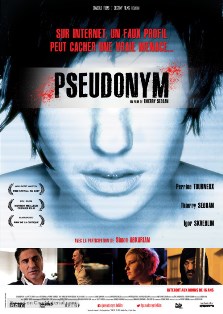
PSEUDONYM
France, 2014, 74 minutes, Colour.
Thierry Sebbban, Perrine Tourneux, Igor Skrebin, Simon Abkarian.
Directed by Thierry Sebban.
Pseudonym is a brief French thriller, a drama with psychological overtones.
The basic plot is fairly straightforward. A divorced businessman is away from his family, communicates lovingly with his daughters by Skype, clashes with his former wife, who seems to have picked up a message that he sent through the Internet, concerning a dinner appointment later that night.
In his hotel room, he makes the Internet contact with a call girl, he preparing a dinner in his room, she having a dinner in her room, and their having a conversation, flirtatious at first, more explicitly sexual, stripping and nudity on her part. She is not exactly the picture that appeared on the website but she makes that more tantalising for the businessman. The businessman is played by the director who also co-wrote the script.
The audience sees some thugs come into a room, there is an issue of money and payment for the woman or, and the Internet connection cut off. The man is desperate, and he had just given his address to the young woman urging her to come to him. After discussions with the thug, she agrees to go, and communicates again with the man. However, she is knocked unconscious, the thug looks out the window and finds the businessman in a building across the way and proceeds to go there.
In the meantime, the young woman goes to a bar, drinks, dancers, loses herself in frenzy.
The rest of the film is the businessman being overcome by two thugs, taken away to an isolated place which looks like a warehouse or a parking lot, is tortured, his ear cut off. And interconnect Internet connection is made with the wealthy boss who is in control and wants information from the businessman. When one of the thugs is distracted by young boy calling in, the businessman takes advantage of surprise, escapes, runs through the building, out into the street, is able to put his legs through the cuff connections and become freer. He uses quite some ingenuity in eluding his pursuers. The boss is very angry and demanding of the thugs.
Just as the businessman seems to be taken again, the film ends.
The film serves as a drama, touches of sexuality, touches of violence and torture, and a cautionary tale.
Published in Movie Reviews
Published in
Movie Reviews
Tagged under
Saturday, 18 September 2021 20:00
Lazarus Effect, The
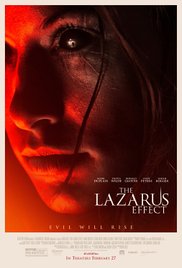
THE LAZARUS EFFECT
US, 2015, 83 minutes, Colour.
Mark Duplass, Olivia Wilde, Sarah Bolger, Evan Peters, Donald Glover, Ray Wise, Amy Aquino.
Directed by David Gelb.
The Lazarus Effect is a brief film about scientific experimentation on reviving the dead, on the possibilities of reanimation.
There was an elaborate film on this theme, Flatliners, from 1990 with a group of students working together and experimenting. It was a cautionary tale.
This is also a cautionary tale, the story of an engaged couple who have a grant, work in the laboratory with a team, develop a serum which enables them to revive a dog. The academic authorities are wary of such experiments and the sponsors of the experiment send a representative to confiscate the serum and the equipment.
The challenge to the team is to conduct an experiment using their equipment but there is a deadline for the expiry of the serum and so they immediately move to action. Here the film changes tone with the fiancee being electrocuted and the decision being made to revive her. But who is the person revived, the same person, or the living dead and the unleashing of monstrous and destructive powers?
The couple is played by Mark Duplass and Olivia Wilde, with the assistance being played by Donald Glover, Sarah Bolger and, providing some comic relief, Evan Peters.
1. Science? Science fiction? Laboratories and re-animation? The exercise of the brain? The death experience, near-death experience, seeing light?
2. The university setting, the laboratory, offices? Academia? Experiments? The musical score?
3. The team, Frank and Zoe, engaged, their love for each other, working together? The approval of the university authorities? The team, Clay and the comic touches, Niko and his earnestness? The arrival of Eva, her collaboration, interest, yet an outsider, her response to the crises, Frank and his suspicions about her? Her full support for the experiment?
4. Reanimation, serum, developing it, the experiments, with the dog? Insertion of the serum, the response, the dog and the results? Death, new personality, destruction?
5. The possibility of human reanimation? The strength of the serum? Scientific possibilities, ethical questions?
6. The response to the dog, Frank and his determination, Zoe and her support? The others?
7. The interview with the academic dean, encouraging experimentation, but academic cautiousness?
8. The arrival of Mr Wallace, sinister, the interviews, his decisions, the taking of the equipment, ownership by the University and the sponsor of the experiment?
9. The decision to use the serum, to go to the laboratory, to work with their own equipment? The timetabling deadline?
10. The experiments, Zoe and her part, her being electrocuted, the effect on her?
11. Frank, his determination, to revive Zoe? The reaction of the others? Hesitations? Suspicions of Eva? Collaboration?
12. Zoe, her body, laid out, the serum, the experiment? The reanimation?
13. The initial effect on Zoe, awakening, not remembering, adjusting?
14. The changes in Zoe, not having that near-death experience, reawakening, the living dead, unleashing her brain, the inner personality, or deforming it?
15. The destruction, the members of the group, the confrontation with Frank, Zoe berserk?
16. The moralising aspect of the story – with the touch of Dr Frankenstein and his hubris? And of other science fiction films about reanimation like Flatliners all films about the use of the human brain, like Lucy?
Published in Movie Reviews
Published in
Movie Reviews
Tagged under
Saturday, 18 September 2021 20:00
City of Lost Children/ Cite des enfants perdus
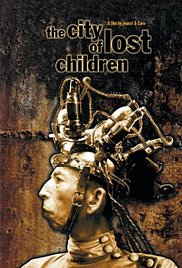
CITY OF LOST CHILDREN/ CITE DES ENFANTS PERDUS
France, 1996, 112 minutes, Colour.
Ron Perlman, Daniel Emilfork, Judith Vittet, Dominique Pinon, Jean- Claude Dreyfus, Genevieve Brunet, Odile Mallet, Mireille Mosse, Rufus, Joseph Lucien.
Directed by Marc Caro, Jean- Pierre Jeunet.
A challenge! Some years ago, French writer-director team, Jeunet and Caro, made a surreal, futuristic satire on an apartment block and food shortage, Delicatessen. This is a much more ambitious and complex second film. First of all, it is a visually stunning film in design, decor, lighting and camera techniques. But the plot? Best to indicate that it opens with a striking Santa Claus dream... and the film is full of dreams. But they are shown in the context of mad scientists doing research on children - especially a character called Krank who wants to steal children’s dreams to save him from becoming older. He is subservient to his father who remains isolated brain in the tank. He has seven children, all played by Dominique Pinon, who all suffer from narcolepsy.
There is a little boy who dreams, his brother who is a strong man in a circus, a young girl from the orphanage, an adventure where the brother and the little girl go on request to find the little boy.
Children are victims of cruel Siamese twin teachers and there are further villains and strange heroes. One wonders whether Jeunet and Caro were making it up as they went along. But, that's probably all right with dreams. There are many thought-provoking themes concerning science, experiments, violence and children.
There is the original French version and an English-dubbed version with some of the cast, including Ron Perlman and Judith Vittet dubbing their characters.
But I think I had better see it again. Wonderful weirdness.
1. The impact of the film? Weird and bizarre? Surreal? A visual work of art? Sound and music?
2. The work of the directors, their films, set design?
3. The surreal locations, the port, the oil rig, the boats, homes, laboratories, interiors, the exteriors, studio stage sets? The musical score? Marianne Faithfull and the final song?
4. The film seen as a fairytale, a weird fairytale, variations on the theme, especially children dreaming, the stealing of their dreams, their nightmares? The city, the children, lost, searching?
5. The cast, their appearances, a selection of grotesques?
6. The child, the dream about Santa Claus, the many Santa Clauses appearing, his fear? The little boy, capture, lost, the search of him? His older brother?
7. Krank, his appearance, the touch of the grotesque and the intimations of the vampire? His being cursed? His quest, not wanting to grow old, the children, harvesting their dreams, discovering they were nightmares? The presence and action of his wife? Midget? His father, the isolated brain, in the water tank, consulting the brain, his voice, his advice? The seven sons, the similarities of appearances, the same actor portraying them all, the differences, the brother wanting to claim being the original, the reaction of the others? Their activities? Unable to sleep? Their influence on the search? On the boat, on the week rig? Interventions and rescues?
8. The strong man, his role in the circus, the circus master? His going, his brother, the trek and the quest, the different encounters, the little girl, the relationship, dependence, innocent? Her being also worldly-wise, the participation in the search, the effect on her?
9. The sisters, Siamese twins, played by two different actresses, echoes of wicked witches, the control of the children, the discipline, their commands, the reactions against them?
10. The focus on to the strong man, the One, his physical strength, his mental limitations, dependence on the little girl, the series of adventures?
11. The little boy, lost, dreams, with the other orphans, their uprising?
12. The overall impact of this story, the invitation to people to follow it, understand it, enter into it, and use their imaginations as they
would interpret the experience of dreams?
Published in Movie Reviews
Published in
Movie Reviews
Tagged under
Saturday, 18 September 2021 20:00
Spear
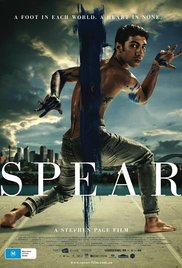
SPEAR
Australia, 2015, 83 minutes, Colour.
Hunter Page- Lochard, Aaron Pedersen.
Directed by Stephen Page.
One might call Spear a cinema event. It was screened at a number of festivals and then received some limited cinema release.
The reason for seeing this cinema event is that it presents the Bangarra Dance Company, celebrated in Australia for over 25 years, an indigenous company, performing promoting aboriginal art, dance, and exploration of ideas. Is also draws strongly on aboriginal history, before the white arrivals and settlement as well as the uneasy coexistence and hostility between black and white.
Stephen Page is the director of the company and the director of the film. His son, Hunter Page- Lochard, is the principal dancer. The full complement of dancers includes black dancers as well as white. There are also some acting roles, principally that of the Suicide Man, played by veteran actor Aaron Pedersen (Mystery Road, the Jack Irish series).
The film has striking visuals, cinema being able to provide an enormous range, and, with the editing, intercutting them with great effect. There are scenes from the city, dark alleyways, a tenpin bowling rink, escalators… Some of the film was made in Sydney, in studios on Cockatoo Island, but there is a great deal of location photography, especially in Arnhem Land, with its waterways, with its desert, foliage, and a pervading red.
The narrative the film concerns Djali, a young man on a journey, a quest for his identity in himself and as an aboriginal man. At the opening, there is a complex ritual, a kind of awakening for the young man, and the consecration. Ochre and paint are frequently placed on him and on other characters, indication of the tradition of the corroboree. As he goes on his journey, he walks through the city, and encounters the Suicide Man and his alcoholic haze, his wry comments, his anger at people passing by. Later, there will be an Old Man, a kind of guide, who eventually hangs himself. Others are described as Alcoholic Man, Androgynous Man, Abused Man, Big Man, Prison Man.
While the film has an immediate impact for an indigenous audience, there are various moments when a white audience will be challenged, invited to reflect, invited to appreciate – and a comically ironic episode featuring the very popular (if now seen as fairly racist) song, My Boomerang Won’t Come Back!
Djali moves through the city and then out into the deserts, encountering a range of characters including an Old Lady, Earth Spirit, Woman of Desire, sometimes presented like icons against the desert background, as are some of the tribal men, covered in white, and standing in the desert.
Accompanying the young man on his journey are a number of dancers, enabling the audience to appreciate the virtuosity and talent of the dance group. While there are some female presences, Spear is predominantly a film about males. At various times there are also white dancers and white actors involved in interactions, both in harmony and in disharmony, struggle and fight.
The event builds to a climax, the achievement of the young man, his coming into his own – although, as one of the few lines of dialogue mentions, he has a foot in each world but his heart is in none.
Published in Movie Reviews
Published in
Movie Reviews
Tagged under
Saturday, 18 September 2021 20:00
Rock the Kasbah
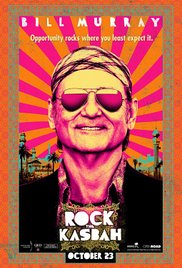
ROCK THE KASBAH
US, 2015, 106 minutes, Colour.
Bill Murray, Bruce Willis, Kate Hudson, Zooey Deschanel, Leem Lubany, Arian Moayed, Scott Caan, Danny McBride?.
Directed by Barry Levinson.
Rock the Kasbah should not be confused with the Israeli military film, Rock the Casbah, or the Moroccan film of the same name about a large family and their relationships. This one is set in Afghanistan.
Since the 1960s there have been satiric films about war and the waging of war, from Dr Strangelove in 1963 to M*A*S*h and Catch-22 in the early 1970s. M*A*S*H introduced the idea of comedy and satire even in contemporary war. While there have been very serious films about American involvement in Iraq and Afghanistan, It is only now that we have the satiric comedies coming in, this film as well as Whiskey Tango Foxtrot with Tina Fey and Margot Robbie.
This is a star vehicle for Bill Murray, capitalising on his laid-back, touch of the lazy, wisecracking conman style. In the United States, Murray is a record executive, Richie, holding auditions with his secretary, Zoe Deschanel who has singing hopes of her own, but mainly interested in affirming the singers and getting them to pay their fees. When a military recruiter visits a club, he is impressed by the singing and suggests to Richie that he goes on one of those entertaining the troops tour – in Afghanistan.
It is an opportunity that Murray has been looking for, but his secretary gets cold feet and, after landing in Afghanistan and experiencing the military atmosphere as well as the possibility of terror attacks, she opts out with the help of a local military character played by Bruce Willis, Bombay Brian.
Richie also gets tangled with Merci, a local prostitute (Kate Hudson) who decides that there are possibilities in a record executive working with local talent. Audiences might be surprised to see one of the Afghan television shows, Afghan Star (a local version of American Idol), with all the glitz and enthusiasm compere and judges, of Western TV talent shows. This becomes all the more important when Richie is caught up country and hears a young woman singing, is entranced by her voice and decides that she is the one. Needless to say, her father and other members of the clan in the village are not support of this at all – although they are not above having a look at the TV show later on.
The singer, Salima (the Leem Lubany) hides in the boot of the car, persists in pressurising Richie that she go on the show and, between the jigs and the reels, many of them, she eventually does, breaking through a lot of the taboos about women, singing, public performance.
As might be expected, the film is very (very) American in tone which might be very popular at home but has its moments of grating on audiences beyond the United States.
1. US, 21st century? Post 9/11? Military operations in Afghanistan, Iraq?
2. The rock world, singers, agents, gigs, audiences?
3. The musical score, the range of songs, in the gigs?
4. The Muslim background in Afghanistan, sharia law, the Afghan war, the warlords, codes, the role of women? Singing in public and the TV program?
5. The American background, Ricky as a Bill Murray character, as an agent, his image of himself, his age, memories, false memories, his agency, working with Ronnie, the initial singer, his praise for her, offering the contract, the handshake, getting her fee?
6. Ronnie, the work for Ricky, composing songs, wanting to sing, her gig in the club, people walking out? The military agent, his enthusiasm, the possibility for tours, Ricky and his agreement, Ronnie and her apprehensions? The plane, fear, arrival, the military, bombs? The hotels, rooms? Ronnie petrified, Bombay Brian and the military background, offering him cash, leaving, Ricky stranded?
7. The contact with his wife, the discussions with his daughter, her warnings? is being stranded and asking for money?
8. The American scroungers, in the clubs, the women, Merci, her typed? The night, the plan, her character, becoming a partner, enthusiastic, despairing with Ricky as a loser, giving up? Urging Ricky to go back to work?
9. The taxi driver, talk, as interpreter, the military connections, going into the villages, the encounter with the warlords?
10. Ricky hearing Salima missing, her being hidden, the desire to sing, gift, Ricky and his trying to persuade her, persuade the father, the guns, the violent reaction of the father, leaving, her hiding in the boot of the car, wanting to walk to Kabul, Ricky taking her?
11. The credits, the TV show, the Afghan Star? The host, discussions with Ricky, listening to Ricky’s lying? The contestants and their reactions? The audience, the judges, the glitz? The range of audiences? The singing, everybody watching on television, the votes? The father’s anger, taking Salima home?
12. Ricky, wanting to give up, Merci, challenging him? The votes and Salima winning?
13. Ricky and his success? Despite himself?
14. The precedent for this kind of film in the Vietnam War, dramas about rock? The role of the Americans, intervening – and the scenes where they were told off? American supremacy, arrogance, telling everyone what to do?
15. For worldwide audiences, the dramatising of situations in Afghanistan?
Published in Movie Reviews
Published in
Movie Reviews
Tagged under